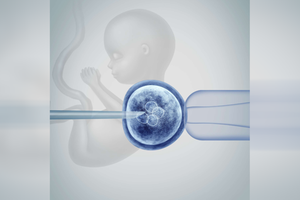
There are some muted concerns regarding the impact of strength training on male fertility.
Healthy lifestyle practices for conception purposes have traditionally focused on women, ignoring the crucial role that men play in the process.
When a couple fails to conceive normally, few remember that just like women, it is very important for men to make healthy lifestyle choices when trying to conceive.
Exercise is an important part of a healthy lifestyle for men, as it can improve fertility by improving overall sperm health and increasing sperm count. These factors are essential for successful conception and a happy, fulfilling family life.
As humanity becomes aware of the benefits of a healthy lifestyle and fitness, many individuals are adding gym workouts to their fitness routines, regardless of their age. However, there are some muted concerns regarding the impact of strength training on male fertility. Some believe that rigorous exercise, such as lifting heavy weights could have a negative effect on sperm count and quality.
Is this true?
Well, according to experts, physical activity is excellent for maintaining a healthy body, but only if done within certain limits. Research says that when done right, exercise can indeed contribute to increased sperm count.
David Kimani, a Nairobi-based urologist and renal transplant surgeon with more than ten years’ experience notes that moderate exercise is beneficial, but extreme exercise is harmful.
"Exercise is good for maintaining weight and good heart and sexual function. Excessive exercise is linked to low testosterone levels and impaired sperm production. It often leads to production of abnormal sperm," says Dr Kimani, who works at Kenyatta National Hospital.
This shows that men need to strike the right balance when it comes to exercise and avoid over-exerting themselves during training especially when trying to have a baby.
"Maintaining a healthy weight and lifestyle is essential for men, not only for longevity but also for them to remain fertile," says Dr Kimani, adding that exercises that produce excessive heat in the male body, particularly in the area surrounding testicles, can affect fertility by reducing the free flow of testosterone, a hormone that plays an important role in male fertility.
It can also affect the release of luteinising hormone, which is the agent that causes the testicles to make the hormone testosterone.
Some of the harmful exercises that should be done in moderation include hot yoga, high-impact training exercise and team sports such as rugby.
Cycling is often criticised for its negative effects on reproductive health. However, Justus Ngumi, a fitness instructor, clarifies that moderate cycling is beneficial for fertility.
"While there is a risk of thermal trauma from wearing tight shorts and sitting on a bike seat for long periods, taking breaks and wearing loose clothing can help minimise this risk," he says.
Studies suggest that excessive cycling can reduce sperm count due to pressure on the perineum (the area of the body between the anus and the scrotum), but leisurely cycling is unlikely to hurt fertility.
"Just make sure you invest in a comfortable, well-fitted saddle to reduce pressure on your reproductive organs," says Mr Ngumi.
"Extreme exercise causes the testicles to heat up and impairs the process of sperm production. Cycling, for example, causes repetitive trauma and is remotely linked to erectile dysfunction," adds Dr Kimani.
Although high-intensity cycling can cause repetitive trauma to the testicles, both cycling and running can be beneficial for people suffering from knee pain. Moreover, these exercises have many other benefits such as improving cardiovascular health and increasing blood flow, which are good for a man's sex life.
Cycling is classified as a low-impact exersise, which makes it less stressful on the knees.
Ngumi says that cycling can be a good option for people who have joint pain because their weight is supported by a bike seat. This results in less impact and stress on the knees compared to working out by walking or running. However, Ngumi emphasises that it is crucial to have proper bike fit and technique to avoid knee strain.
"Improper bike setup, riding technique and pre-existing knee conditions can cause knee pain. Incorporate cycling into your fitness routine and ensure proper bike fitting to alleviate pain." he says.
Cycling is also great for glutes and hamstring workouts, and for building strong muscles around the knee.
"If your partner enjoys cycling, there's no reason to stop. In fact, it can improve his fertility and provide other health benefits as well," he says.
Walking and swimming are great physical activities that can enhance one’s flexibility and also strengthen the cartilage.
The role of exercise in male fertility
Regular exercise can help you maintain a healthy weight, reduce inflammation and improve blood flow, all of which can contribute to better reproductive health.
Exercise can also help reduce stress, which can positively affect sperm count.
According to the fitness enthusiast, weight lifting, running and jogging are associated with higher sperm concentrations than other types of exercise.
"By combining regular exercise with a balanced and nutritious diet, you can naturally boost your fertility. So, whether you prefer to hit the gym, go for a run, or do anything that gets your heart pumping, it's important to stay active and get regular exercise," says Mr Ngumi.
Strength training studies have shown that strength training can boost testosterone levels in men. This natural and healthy approach is an excellent way to improve your testosterone levels without putting yourself at risk of infertility, which is a common side effect of steroids.
"Testosterone is essential for healthy sperm production, maintaining fertility and general body functions. A decrease in testosterone levels can lead to various problems such as fatigue, mood swings, memory problems and increased body fat, which can negatively affect your wellbeing and fertility," says Mr Ngumi.
So, what are the best exercises to boost sperm count?
“Cardiovascular exercise is great for a man’s overall health and can also have a positive effect on his sperm quality and count. Running is an easy and effective cardio exercise that is good for working your whole body and clearing your mind.
“A quick run does wonders for the body, mind and reproductive health when you're stressed and have time to spare," says Mr Ngumi.
Running also increases serotonin and dopamine, which are the two neurotransmitters essential for mental well-being. So, to help yourself and your sperm, why not try running?
Obesity and its impact
Research shows that obese men have lower fertility levels than men whose weight is in the normal range. Underweight men also suffer from infertility. Exercise not only improves sperm quality but also quantity.
"Obesity is bad because the male hormone testosterone is converted into the female hormone, estrogen, in fat tissue. Therefore, losing that fat helps," says Dr Kimani.
He adds that resistance training such as bodyweight training can increase testosterone levels in men. Higher testosterone levels can lead to an increase in sperm count. It is important to include compound exercises such as squats and deadlifts in your routine for the best results.
Stress has always been overlooked, but it can affect fertility by causing hormonal imbalances, affecting sperm production and reducing sperm count.
To combat stress, individuals are encouraged to practice relaxation techniques such as yoga, meditation and other stress-reducing exercises. Incorporating these practices into your daily routine can create a healthier environment for sperm production.
Interval training and aerobic exercise are both effective ways to improve sperm count and fertility. High-intensity interval training (HIIT) involves short bursts of intense activity, followed by short periods of rest. This type of exercise stimulates the production of testosterone, which plays an important role in sperm production.
Pelvic floor exercises (Kegels): to do or avoid?
Pelvic floor muscles can become weak due to many reasons, including previous bladder surgery or bowel problems, constipation, being overweight, heavy lifting and general inactivity. Strong pelvic floor muscles can help you maintain an erection and prevent premature ejaculation.
Kegel exercises are specifically designed to strengthen the pelvic floor muscles. Keeping these muscles healthy and strong is crucial, especially for maintaining an active sex life.
To improve the strength of your pelvic floor, Mr Ngumi recommends two types of exercises:
1. Endurance Kegels: Squeeze your pelvic floor muscle and hold for five to 10 seconds, then completely relax the muscle for five to 10 seconds. Repeat 10 times.
2. Quick Kegels: Quickly contract and relax the pelvic floor muscle for 10 repetitions. Repeat these two exercises three times a day. Squats are effective for strengthening the pelvic floor muscles, but ensure that the gluteal muscles do not do all the work.
To contract the pelvic floor muscles, exhale as you squat. When squatting, inhale on the way down and exhale on the way up and contract the pelvic floor muscles by doing a Kegel exercise.
Before attempting squats, it is essential to master the simple kegel exercise of isolating and contracting the pelvic floor muscles. It is important to note that sometimes a bigger movement can hide a weak muscle and your pelvic floor can get a free ride.
Kegels to avoid
Sometimes men's pelvic floor muscles become too tight, which can cause pelvic pain, difficulty passing urine or constipation.
Doing full sit-ups puts a lot of pressure on the pelvic floor, which is not good. It is also advisable to avoid lifting heavy weights and holding your breath during lifting exercises.
Activities such as running, jumping or high-impact exercises that can cause urine leakage should also be avoided until your strength improves. This condition is similar to pelvic pain experienced by women after childbirth.











